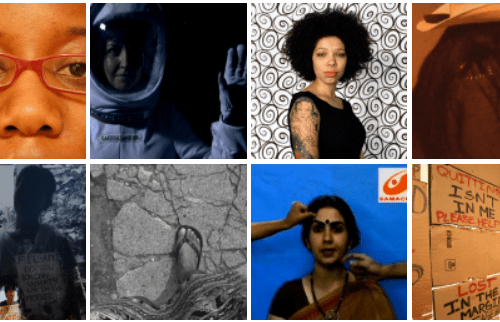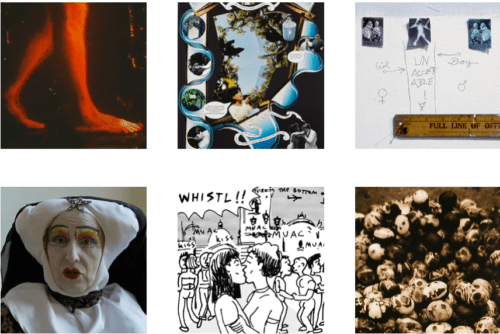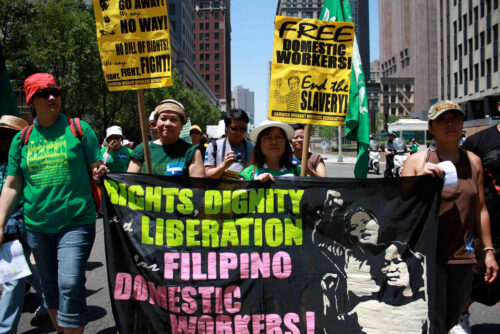Southerners on New Ground (SONG) connects us to the collective rhythm and dreams of the South through legacies of resiliency and resistance, transformation and movement building. This article reflects a conversation about SONG from the perspective of older and newer members to SONG. Cara Page, Evelyn Lynn, Lamont Sims, and Noemi Molitor came together in August 2010 to talk about SONG’s meaning in the context of organizing around social justice in the South.
SONG is a Southern regional organization that builds strategies for economic and racial justice through a lesbian, bisexual, gay, transgender, queer, gender non-conforming, and two spirit (LBGTQTS) lens. SONG focuses its efforts and resources on rural communities in the U.S. South by offering Organizing Schools, workshops on community and movement building, as well as member-organized social spaces and other forms of social justice work and coalition building.
Sixteen years ago, three African American and three white lesbians came together to found SONG to focus on the South as a political region, attentive to its legacies, and the South as a space of living and community for LBGTQTS people. SONG is and has always been a membership-based organization. It is a multi-racial organization doing multi-issue work, addressing how racism affects our communities, foregrounding the perspectives of working class folks, and always articulating how different forms of oppression are connected. SONG is invested in transformational work. We strive to create space to collectively envision our lives free of oppression, to resist assimilation, to think about what we need to build movements rather than single-issue campaigns, and to create the kind of community and support structures we need to survive as people of color, as queer people, as people with disabilities, and as all of the above marginalized communities in the South.
While SONG focuses its energies on rural communities, SONG does occasionally work in cities such as Atlanta, where we met to write this article. We asked each other questions about SONG’s work and vision: How do we see SONG in relation to movement building, to queer politics and feminism, and to social justice issues in the South? We reflected a little bit on academic research, as it is helpful to the cause, and, most importantly, we exchanged our experiences with, concerns about, and longings for activist work. While we present our conversation as a whole, our individual perspectives remain visible and audible. As you read, our individual voices and stories will be highlighted at times within a context of our common ideas and visions. Let us briefly introduce our literal kitchen table:
Cara Page has been with SONG for two generations, from its leadership in the 90s, to its new leadership in Durham, North Carolina, to the present. These days she lives in Atlanta, organizing in the South with SONG and the Kindred southern healing justice collective. She described a process of “colic and rebirth” that SONG underwent a few years ago when co-directors Caitlin Breedlove and Paulina Hernandez held a listening campaign to position SONG’s strategic action in the South.
Evelyn Lynn first encountered SONG in 1997 when attending the National Gay and Lesbian Task Force Creating Change conference. Having left the South in search of LBGTQTS political community, this brief encounter with SONG spoke to that longing for political community and offered a glimpse of the kind of support she might have if she returned home. Evelyn’s more recent relationship with SONG began in 2006 while she was living and working in New Orleans and trying to handle the aftermath of Hurricane Katrina. During this time SONG offered much needed support to local communities around healing, trauma, and survival.
Lamont Sims came across SONG quite recently and is a member of BlackOut at Georgia State University, a Black queer student organization that exists to challenge all oppression. He is also a member of Sweet Tea: Southern Queer Men’s Collective, a small group of queer men based in Atlanta who challenge sexism. From 2009 through 2010, Lamont was part of the Atlanta Mentorship Circle; this 6-month program brought together LBGTQTS activists from the metro-Atlanta area for co-mentorship training around social justice work. Working towards “local capacity, unity and interconnection of people in the state of GA”, the circle envisioned “social work that is cross-issue, anti-oppression, and meets at the crossroads of race, class, culture, gender, and sexuality”. The Mentorship Circle is also where Lamont and Noemi connected.
Noemi Molitor learned about SONG through her chosen-family in 2006 and has been with SONG in spirit ever since. In 2009, she moved from Germany to the U.S. and got to join SONG in person. She is currently pursuing her PhD in Women’s, Gender, and Sexuality Studies at Emory University in Atlanta where she commits herself to social justice struggles in her scholarship. She continues to be involved in political projects in Berlin that address the legacies of German colonialism. In this vein, she has worked to push the critical remembering of street names that celebrate colonial actors and worldviews in Berlin’s cityscape today, and has lobbied to rename them while publicly documenting their history.



